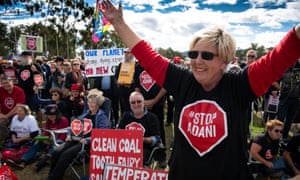Environmentalists rejects suggestions progressive tactics like Stop Adani convoy cost Labor the election
The environmental movement drew first blood on election night by helping independent Zali Steggall oust Tony Abbott but, in the end, the Coalition – which rated a miserable 4% on the Australian Conservation Foundation’s climate change scorecard – won.
Environmentalists are slightly shellshocked by the unexpected result and are questioning whether their campaign tactics need revision or the progressive side of politics was let down by other factors. But everyone can agree that this is one issue that cannot – and will not – go away.
The Australian Conservation Foundation chief executive, Kelly O’Shanassy, told Guardian Australia climate “was definitely a top issue in the election … but it didn’t convert to votes in all the places it needed to”.
The Wilderness Society national campaigns director, Lyndon
Schneiders, said its campaign got swings in eight out of its nine target
seats, despite Labor falling short in Reid, Flinders, Kooyong and
likely Boothby.Environmentalists are slightly shellshocked by the unexpected result and are questioning whether their campaign tactics need revision or the progressive side of politics was let down by other factors. But everyone can agree that this is one issue that cannot – and will not – go away.
The Australian Conservation Foundation chief executive, Kelly O’Shanassy, told Guardian Australia climate “was definitely a top issue in the election … but it didn’t convert to votes in all the places it needed to”.
“I remember the 2004 forestry election, I know the feeling of ‘oh my god our issue sunk a party’ – I’m not feeling like that today,” Schneiders said. “I’m surprisingly optimistic – the last six months is the most we’ve talked about the environment for a generation.”
But in Queensland, Nationals MPs including Michelle Landry and George Christensen are prepared to heap the blame – or more accurately, the credit for the conservatives’ strong vote in central Queensland – on campaigns like Stop Adani and particularly the convoy organised by the Bob Brown Foundation.
“I never expected numbers like this,” Landry told the ABC.
“Thank you Bob Brown is all I can say. He came up here trying to tell Queenslanders what we should and shouldn’t be doing, and it actually drew together the agriculture and mining sectors – I’ve never seen anything like it.”
Peter McCallum, the coordinator of the Mackay Conservation Group, rejects the suggestion, noting the LNP had made gains in places with no stake in coalmining, like Tasmania and Western Australia.
But he said the “lie” that Labor would shut down the coal industry pushed by Clive Palmer and News Corp had hurt.
O’Shanassy said the “myth” that there is a binary choice between jobs and the economy is persistent and was “a very strong part of the Coalition campaign”.
But there were “too many moving parts” in the campaign to say that high-profile tactics like the Stop Adani convoy may have contributed to the disappointing result.
O’Shanassy cites the Coalition’s negative campaign on tax, Bill Shorten’s unpopularity and Palmer injecting “millions and millions of dollars” into the campaign as other possible causes.
“Outside those central Queensland seats, Australians don’t support the Adani coalmine.
“So [the Stop Adani convoy in Queensland] doesn’t explain this election result – some people might want to spin it that way – but we need to look at what really happened rather than look for scapegoats.”
Schneiders said the Wilderness Society will hold a review of its first national campaign in a decade but – far from the environment losing the election for Labor – it “in many respects was one of the real positives for them”.
GetUp’s exit polling found climate change was the voters’ top issue in Warringah, where Tony Abbott lost to Zali Steggall, in Josh Frydenberg’s seat of Kooyong and in Menzies.
Independents including Steggall and Helen Haines in Indi and the Centre Alliance’s Rebekha Sharkie in Mayo all want a better climate policy and there were swings to Labor in inner-city Melbourne.
Paul Oosting, the national director of GetUp, said “the leading climate denier Tony Abbott was unseated”. “It’s clear the Coalition aren’t meeting the public’s expectations and need to change their approach or face more Warringahs.”
Schneiders said it would be “unwise for the prime minister not to recognise his government is very vulnerable on the environment”. The Coalition may feel “they’ve had a happy day now – but the job just gets harder again as soon as they get sworn in”. “It’s a tactical win – the problem hasn’t gone away.”
O’Shanassy said concern about climate change “goes across political lines”. During door-knocking in the electorate of Chisholm, eight out of 10 voters committed to consider the climate, including Liberal voters.
So while the Liberal party retained most of its blue-ribbon seats, like Higgins and Kooyong, O’Shanassy said there is “rising concern from Liberal voters” that the party will need to take seriously – in the same way the state election drubbing in Victoria sparked a flurry of environmental policy announcements from Scott Morrison.
“There’s no doubt the Morrison government needs to deal with climate and energy – and they won’t be able to continue to put it in the too-hard basket.”
While the ACF and others rate the Coalition’s emissions reduction fund as poor environmental policy, part of the problem may be that one-third of the electorate still can’t say which major party has a better policy.
“Climate change is complex issue and people are confused by it and where the parties stand – it’s up to the ACF to help Australians understand that better,” O’Shanassy said.
O’Shanassy said the ACF will also need to “learn and adapt” and “seriously consider our strategies” but she believes rising concern about climate, particularly among the young, makes action inevitable.
“We must continue to build people power – there’s no way we’re going to move politics unless people demand it.”

No comments:
Post a Comment